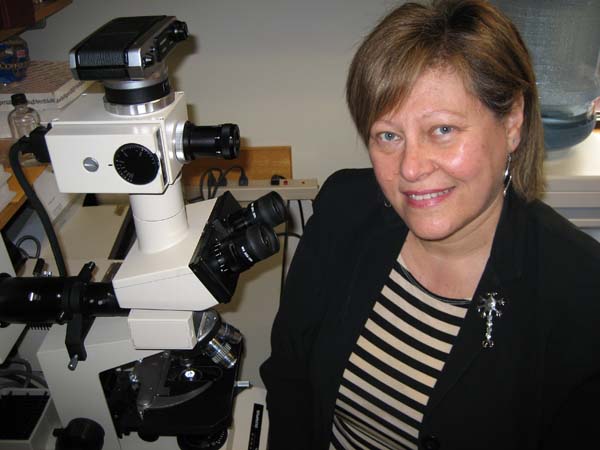BUSM Researcher Receives Award for Work on Protective Protein for ALS

 A professor at Boston University School of Medicine (BUSM), Carmela Abraham, PhD, recently received one of six Massachusetts Neuroscience Consortium Awards for 2014. Among 60 applications, her work on multiple sclerosis and the role of Klotho, a life extension protein, in the repair of white matter in the disease was selected to be distinguished. Each year, the consortium carefully and stringently selects awardees among those working in translational research in neuroinflammatory and neurodegenerative diseases, such as Amyotrophic Lateral Sclerosis, Alzheimer’s disease, Huntington’s disease, Multiple sclerosis, Parkinson’s disease, neuropathic pain and treatment-resistant depression.
A professor at Boston University School of Medicine (BUSM), Carmela Abraham, PhD, recently received one of six Massachusetts Neuroscience Consortium Awards for 2014. Among 60 applications, her work on multiple sclerosis and the role of Klotho, a life extension protein, in the repair of white matter in the disease was selected to be distinguished. Each year, the consortium carefully and stringently selects awardees among those working in translational research in neuroinflammatory and neurodegenerative diseases, such as Amyotrophic Lateral Sclerosis, Alzheimer’s disease, Huntington’s disease, Multiple sclerosis, Parkinson’s disease, neuropathic pain and treatment-resistant depression.
Carmela Abraham received her Bachelor of Science in Biology from Tel Aviv University and her Ph.D. in Neuroscience from Harvard University. In addition to this award, she is also the recipient of the Neuroscience Education and Research Foundation Award for Outstanding Promise as a Young Alzheimer’s Investigator. She also received the Zenith (1994) and the Temple Awards (1999), two of the most prestigious awards that the Alzheimer’s Association gives out each year.
Abraham has dedicated her career to understanding the mechanisms that culminate in Alzheimer’s disease and influence brain aging. She found that Klotho, a neuroprotective protein, has extremely positive effects in Alzheimer’s and Multiple Sclerosis animal models. This protein is reduced in the brain while normal aging and Alzheimer’s occur, which prompted Abraham and her team to look for molecules that could help increase the Klotho levels in the brain. The goal is to use these molecules to invent new treatments that can prevent the brain from aging, neuroinflammatory and neurodegenerative diseases.
The Consortium was created by Massachusetts Life Sciences in 2012 as a strategy to bring scientists, companies and government together and, consequently, accelerate new and promising translational neuroscience research projects. Participants such as AbbVie, Biogen Idec, EMD Serono, Janssen Research & Development, Merck, Pfizer and Sunovion Pharmaceuticals provide funding to support grant winners and their research.
In other news on research grants supporting treatments for ALS, the ALS Association recently awarded three new grants to scientists in Massachusetts General Hospital, Harvard Medical School and Penn State Hershey Medical Center, and Drexel University to study how weight loss, mindfulness, and cognitive and behavioral modifications can benefit patients living with the disease.






